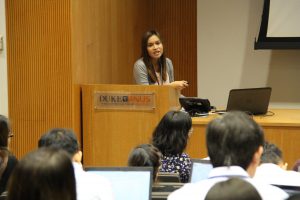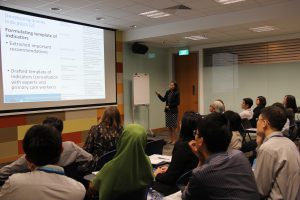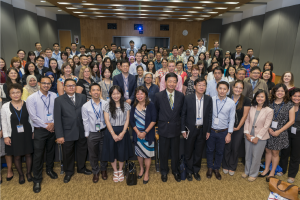The 5th HTAsiaLink Conference
The 5th annual HTAsiaLink Conference officially concludes after a four-day intensive gathering of HTA practitioners and experts in Singapore. The conference was jointly organized by the Ministry of Health, Singapore, the Health Services Research Department of the Eastern Health Alliance and the Health Services Research Institute of SingHealth and took place at Duke-NUS Graduate School between the 3rd to the 6th of May 2016.
Now at its 5th year, the conference has received its highest number of abstract submissions and highest number of participants to date. The network has grown substantially since its inception in 2010, starting with only five member organizations to this year’s astonishing 28 organizations from at least 15 different countries. It is noteworthy to mention that the HTAsiaLink conference has not only been a platform for research to be shared amongst peers and colleagues across Asia and the west but has increasingly emerged to become the stage with which countries who wish to incorporate HTA into their decision-making process can learn about HTA case-studies from other countries who already have an HTA institutional arrangement embedded in their policy-making, such as Thailand or as hospital-based, like Singapore.
Plenty of newcomers and HTA neophytes emerged at this year’s conference. A delegate from the Essential Medicines and Technology Division (EMTD), Department of Medical Services, Ministry of Health, Bhutan, has noted that this was his second time to attend the HTAsialink conference and hopes to attend in the incoming years. He remarks that the HTAsialink conference was a good platform of learning on how to conduct HTA as it would apply to Bhutan.
This year, the conference was divided into four parts – on opening day, it began with pre-conference workshops from various HTA experts flown in from Europe, Australia and Singapore with lectures on economic models, multi-criteria decision analysis (MCDA), health care systems dynamics and how to present your research at a conference. The second and third day was filled with plenary sessions and the presentation of relevant research from all the members of the network. On the last day a plenary session was held in the morning on, how much do institutional arrangements make for HTA discussing the different types of HTA bodies that countries can have and whether they make a difference for evidence-based policy. In the afternoon, the closing session included the members and the board meeting. These meetings were substantial to set the direction of the network as a whole.
One of the features in the line of workshops during the pre-conference was a session on Value focused thinking in MCDA in HTA and Health policy jointly held by Professor Alec Morton from the University of Strathclyde and Ms. Laura Morris from NICE International. In the session, Professor Morton highlights that HTA practitioners not only focus on providing analyses that showcase cost-effectiveness and budgetary impacts. Analyses may also include how specific interventions will perform under different criterion. The advantage of providing these types of analyses to decision-makers is for them to have a better knowledge of the trade-offs they are making when embarking on a specific policy, not simply in terms of cost-impact but also in terms of operations and implementation impacts.

In the second and third day, the following abstracts were awarded for the successful presentation of relevant research under Economic Evaluations:
1st Place: Steven Yingpeng Qiu, CNHDRC, China, Cost-effectiveness analysis of Tenofovir Disoproxil Fumarate nucleotide antiviral therapy for chronic hepatitis B patients in China
2nd Place: Wantanee Kulpeng, HITAP, Thailand, Cholangiocarcinoma screening program in Thailand: a cost-utility analysis
3rd Place: Mohamed Ismail Abdul Aziz, Ministry of Health, Singapore, Cost-Effectveness of Nucleos(t)ide analogues for the treatment of hepatitis B
The following abstracts were awarded for the successful presentation of relevant research under Health Systems Research:
1st Place: Sally Wortley, University of Sydney, Australia, Tailoring public engagement to HTA decision-making: a discrete choice study
2nd Place: Sarocha Chootipongchaivat, HITAP, Thailand, Estimating human resource impact from introduction of pneumococcal vaccination program in the Philippines: an alongside economic evaluation study
3rd PLace: Roongnapa Khampang, HITAP, Thailand, Developing quality indicators for the Quality and Outcomes Framework program in Thailand
3rd Place: Roza, Sarimin, MaHTAS, MoH, Malaysia, Water Birth: How Safe and Effective?
This year’s lineup of research has markedly improved, according to Dr. Peter Coyte of the University of Toronto, a frequent commentator and participant in HTAsiaLink’s panel of judges over the years. This only shows how much the capacity and the expertise for HTA in Asia has improved and will continue to improve.
The 6th HTAsialink conference is set to be hosted by Vietnam’s Health Strategy and Policy Institute (HSPI). There is certainly more in store for HTA in Asia. HTAsiaLink is poised to be one of the vehicles for the diffusion of HTA in Asia. In this same manner, IDSI’s partnership with the HTAsiaLink Network will undoubtedly become a linkage to look forward to in years to come.
